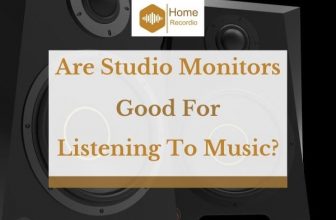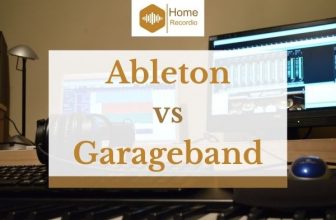13 Ways To Make Money As A Music Producer
For musicians and creatively minded music editors or producers, daily life can sometimes be a bit of a drudge. You are filled with so many brilliant ideas bubbling below the surface, and you have so much passion, but unfortunately passion doesn’t pay rent, does it?
As a 21st century musician or music producer you need to find a way to utilize your considerable skills and talent to make some money. Gone are the days when a friendly patron or experienced manager will swoop in to help you get your foot in the door and really start your career.
In the competitive modern music scene, you have to be prepared to take advantage of the newest technologies and techniques to get ahead.
The difference between brilliant unheard-of music producers, and the top name music producers lies in their ability to commercialize their skills.
Thankfully, many people have trod this path before. With that in mind, we have assembled a list of the very best ways for a music producer to make money in this crowded field. You must be aware that it is not easy, and the competition is fierce.
But if you explore all these options and put your mind to it, then there is a very real possibility of making good money from this business.
Many of the skills listed here will rely on good familiarity with technology, but the old skills of personal charm, charisma and networking are still as relevant as ever, and will help you build a real viable career.
How To Make Money As A Music Producer
There is an infinite amount of ways for how to make money as a music producer, but in this comprehensive article we have decided to limit it to the top 13.
These methods are all tried and tested, and although they have differing difficulty levels, they all have the potential to generate you large sources of income, if you use them correctly.
Table of Contents
Use YouTube Like A Pro
Video: “My YouTube Tips For Growing Your Channel as A Producer!”
This might seem like an obvious one, but you would be surprised at how many music producers overlook this option when they start to produce their own music. There may be an element of snobbery to this, which leads to some people dismissing it too early.
This may be because it is not exclusively a music platform, but this can actually be a great advantage. The audience for a successful YouTube video is huge, many times larger than on a dedicated music streaming service.
You should not overlook the casual ‘everyman’ music listener, because they could be your largest audience.
Other Advantages of Youtube
As well as the huge audience figures, there are a number of other advantages to this medium. First, it is a highly democratized medium. This means there are no gatekeepers designed to limit or screen’ your content.
You don’t need to convince any penny-pushing editors or publishers of the merits of your music, you can simply post your music and let the audience decide for themselves.
This has led to a veritable revolution in the world of music production, with more and more independent and amateur music producers throwing their hat in the ring. The low barrier to entry is definitely one of the greatest advantages of a tool like YouTube.
Of course, if you want to make a quick buck, then YouTube may not be the most efficient option. It can take years of dedicated content creation to build up your audience until YouTube start sending you large cheques.
However, when the payoff does come, it can be worth it. Even if you don’t make lots of money, starting a YouTube channel can be a great way to showcase your music, build up a loyal following, and give samples of your talented artistry.
Grow Your Personal Brand
Video: “Music Branding | 3 Steps To Build Your Music Brand”
The era of the personal has well and truly arrived. This is very evident in our daily lives, especially in the world of social media. Even large corporations have noted this trend and have started co-opting influencers and social media stars for brand promotion and name recognition.
What has this got to do with making money as a music producer though?
Well, one of the best ways to get recognized and approached in this industry is to have a strong network and ‘brand’. You need to invest in yourself and your image, so that if companies or individuals use your services they will want to publish and promote this fact.
It’s Not Only About Your Music
When they use your music production services they are not only borrowing your time and talent, they are also borrowing your good name and personal brand, which can sometimes be the more valuable part of the deal.
This is something that music purists might struggle with, since they think the entire focus should be on the recorded music. But you need to put these qualms to one side if you want to make money in this evolving industry.
So how can you build a good personal brand as a music producer?
There are lots of different things you can do. Be sure to set up separate online social media accounts for your music business, and post regularly to Instagram, Facebook and more.
Be conscious about what you promote, repost and generally advertise on your profile. You need to strive for a consistent look and message. It helps if you can focus on one music genre. Post samples of your work and try and generate enthusiasm around your work, possibly by using free giveaways or humour.
A successful personal brand is a sure-fire way to succeed in the world of modern music, so it is worth spending time to get this right.
Patreon Is The Way Forward
Video: “This Is How Musicians Make A Living With Patreon”
This is the next stage. Once you have built a considerable following and refined your personal brand, you need to find a way to monetize your popularity. Patreon has become one of the most popular ways to do this in recent years.
The basic principle of Patreon is pretty simple. Your ‘patrons’ pay a recurring monthly subscription (of which you get most and Patreon take a small percentage) and in return they get access to exclusive content, merchandise, first access to public content etc.
One of the major attractions for patrons is that they get some personal interaction with their favorite content creators through the patron app, so it can feel a bit like being backstage with your favorite band.
Be aware that you will need a sizeable catalogue of good music before people will be willing to pay you a monthly fee. You need to convince your audience that this is worth it and of good quality. This is where all the hard work that you have done on other platforms such as Spotify and YouTube can really come to fruition.
You need to be careful that Patreon doesn’t stunt your future growth too much, by making too much of your music exclusive and inaccessible. This can be a delicate balance of caring for your loyal patrons but also appealing to the general public.
If you can strike this balance, the results can be very lucrative!
Use Freelancing Sites Like Upwork
Freelancing is another great way for how to make money as a music producer. In the past this may have been perceived as just a means to make small money for completing boring administrative or IT related tasks.
But things have changed. Now creative people are getting onboard with the freelancing mindset, and websites are starting to fill up with music creation related tasks.
Upwork is one great freelancing website that music producers can take advantage of. For example, on this website they can offer their expertise in music recording, music editing, mixing or mastering services, music writing or live performances, or even just critical music review.
The possibilities are truly endless.
One thing that sets Upwork apart from its competitors is that it is quite selective when it comes to hiring musical freelancers. This means you will need a strong portfolio of work. This is where a previous online ‘footprint’ such as on Spotify or YouTube can once again come in useful.
Once you are in you can interview for various freelance contracts and positions with a great variety of employers. This online marketplace can very quickly result in good pay. And the beauty of this system is that you can work as much or as little as you like.
The freedom and flexibility of this route, as well as the relatively quick returns, are what attracts music producers to try this method.
Don’t Forget About Fiverr
Video: “How I Make $1000 a Month on Fiverr as a Beat Maker”
This is another great freelancing site that offers extreme flexibility and ease of use. The simple concept behind the site is that people offer services for a set amount (often a fiver), and people then request those services.
It is a simple and elegant marketplace. It is not exclusive to the music world, people can offer services for everything from dog walking to flying lessons.
Sometimes making money from music production or mastering services can be a long hard slog, but Fiverr gives you a relatively quick and convenient means to start making money straight away.
Obviously, the more experience and good reviews the more premium you can put on your time, so you can start raising your prices. But often it pays to keep your prices low at the start, to build a loyal base of clients.
Be careful not to undersell yourself, because you may find yourself spending far too much time perfecting a song that is only worth a few dollars.
Freelancing is one of the real growth markets in the music industry, which brings its own set of challenges and advantages.
Practice Selling Royalty Free Beats
Video: “How to sell beats: Collect royalties using BMI and Copyright.gov”
Freelancing is by definition a type of ‘active income’ activity. You simply trade your time and expertise directly for money which is what most people do every day at the office.
But as a music producer you also have the potential to build ‘passive income’ streams, which allow you to do a bit of work now and claim the monetary rewards on an ongoing basis from now on. Essentially, you can make money while you sleep!
One of the best ways to do this is by selling royalty free beats. Beats are simple backing track ‘beats’ that you can sell to independent artists, managers or large-scale music producers. They pay a once off price and then have the right to use that beat without paying you royalties in the future.
On the other hand, they do not get exclusive rights to use the beat, so other people can also buy the same ‘beat’. This means that you can sell the same piece of work over and over again, hence generating ‘passive income’.
The best method to sell your beats is to set up a simple website of your own, using a domain hosting service that specializes in music websites. This isn’t very expensive, and it can make you seem much more professional and legitimate.
Royalties Are King
Video: “How to Start a Music Royalty Business”
The traditional way that music producers make money is by earning royalties.
Royalties are a concept unique to the music industry, where the artists and producers that originally make the music are paid a small few every time that song is played on TV, radio, streaming services etc. The small fees can certainly add up.
Even though the music industry has changed almost beyond recognition, the concept of royalties is not totally dead. You can earn royalties by putting up your music on Spotify, Google Play and iTunes.
These subscription services will track how many people listen to your music and will pay you a fee accordingly. You will need to have already gathered a loyal fanbase to really make any money this way, but if you use it at the right time it can be a great way to elevate your brand to the next level.
Just don’t expect to be getting a cheque in the post any time soon, because those days are well and truly gone!
Create An Online Course
Video: “How to create an online course THAT SELLS (from a 7 figure course creator)”
Teaching might not be top of your agenda, but if you’re serious about finding out how to make money as a music producer, then you shouldn’t overlook the benefits of this route.
Most music producers don’t aspire to be teachers but creating an online course can actually be a very lucrative business and can look very good in your portfolio.
Not only that, but it can be a very rewarding experience to watch as your students consume your learning and come out the other side as better musicians.
There are lots of techniques you need to master to make a good online course, and that is beyond the scope of this article. You need to make your course engaging but approachable, so that people will be inspired when they see it advertised but won’t find it too daunting a challenge.
Find A Way To Stand Out
You might try and attract by showcasing some of the musical skills that they will master if they complete the course. The online course marketplace is on its way to becoming saturated, so you need to find a way to stand out.
This might be by offering a ‘price reduction for testimonial’ scheme or just by focusing on a very specific niche.
Getting the price point of your course right is extremely important. You don’t want to undersell your time and effort, but if you make it too expensive then you might put people off. Consider charging a lower price until you get a few good reviews and gain some traction.
Then word of mouth and good SEO (Search engine optimization) should help attract more and more customers.
There are lots of great websites that you can use to host your online course, but you may need to invest some money in good software and camera equipment at the start, to record a real, professional-grade course that people are willing to pay for.
Teach Online
Video: “How to setup and use Zoom for online music lessons”
This is a related way for how to make money as a music producer. The first step to teaching online is self-introspection. Consider what marketable skills you have, and what level you could teach them to.
For example, skills such as music editing, music recording, mixing/mastering, or just equipment setup are in high-demand and you will definitely find willing students.
There are a great many sites that you could use to advertise your skills. Some of these specialize in music and others are much more general.
Some of these will take a large chunk of the fee for themselves, so once you find willing students it might be better to use Skype or other methods to teach them, and hence cut out the middleman.
Much like freelancing, giving online lessons or tutorials is a flexible way to make money. And it can be quite profitable, depending on what demography you target. You could earn more than 40 dollars an hour providing high-quality, one-on-one lessons online.
If you are going to teach then make sure to create structured plans that target your students’ weaknesses, and remember to always be patient, approachable and friendly.
Not only will this make the experience more enjoyable, but it will also win you more customers through positive reviews and word of mouth.
Music Licensing
Video: “Earn $2,500/month w/ Music Licensing In 1 Year”
When people wonder how to make money as a music producer, you might not immediately think of music licensing, but it can be a profitable route if you play your cards right. So, what exactly is ‘music licensing’?
Music licensing is a term that means you make your music available for use in TV and movies. These institutions and producers can then pay huge sums of money to find exactly the right song or instrumental piece to suit a certain scene.
Usually this is done through the medium of huge music libraries. These libraries are repositories for thousands and thousands of clips and songs, and screen producers usually pay a sum to trawl through these libraries.
If your clip is picked up then the fee will often be split between you, as the creator, and the music library service. Notable names in this industry include crucial music and marmoset, but other brands are also available.
The good thing about this route is that as well as being paid upfront, you can also earn long-term royalties due to re-runs and playbacks etc.
Imagine hearing your music pop up in the next Hollywood blockbuster or Netflix hit. That would certainly help launch your career in music production.
If you really want to make it big in the music licensing sphere, then you should try and craft music that is broadly applicable to TV and movies. This means you can use vocal cues or images that frequently crop up on the small screen or silver screen.
Consider writing about themes such as love and heartbreak or introduce tension or suspense in your music.
Other Creative Media
Don’t restrict yourself to just writing for TV and movies. There is a big wide world of content creators out there who may need some audio expertise. For example, lots of big social media influencers or YouTubers may need to come up with a fancy jingle or some original music for their videos.
Similarly, indie gaming companies or streamers are constantly on the lookout for cool new music. Don’t overlook these avenues just because they are a bit newer and more novel.
People working in a creative sphere are usually attracted to other creative people. If you build a strong following or personal brand, then you may be in a position to approach these creative types about collaborating with them.
This can be a great way to show your work to a totally new audience. It might be slightly more difficult to find these types of opportunities because they won’t be advertised on freelance websites.
You may need to approach these people yourself, but if you start to build a solid portfolio then it becomes a lot easier.
Don’t overlook the opportunities that social media and other 21st century platforms can offer you as a music producer. You don’t necessarily need to make it big with a traditional ‘big name’ to score a lucrative deal.
Mix/Master Your Way To Money
Video: “How I Started Making Money From Mixing and Mastering Music!!”
If you aren’t pushed about exclusively writing and producing your own music, then you can make a lot of money by offering mixing and mastering your services to other artists.
Many smaller or independent artists don’t want to pay the huge fees to record at a professional studio, so if you have the equipment, software and talent then you can make a killing by undercutting the studios.
You can make as much as 500 dollars for a single song sometimes.
Obviously, the amount you can charge will be based on your level of quality and experience, but once you get some good reviews you should have no problem attracting new clients.
This is a booming industry and most artists don’t have the required skills and equipment to do it for themselves.
If you do decide to pursue this line, then you will want a comfortable home studio setup to work. It is also vital that you build a strong network of contacts and have access to the latest software and subscriptions.
A good ear is the main requirement for mixing, and if you have that then you can easily acquire a lot of the other skills.
Sell Sample Packs
Video: “How to make money selling sample packs”
If you have the required talent and time, then this is a sure way for how to make money as a music producer. Sample packs refer to clips of synth sounds, musical riffs or drumbeats that you sell separately to be interwoven into lots of different musical pieces.
Many people prefer to use these off the shelf samples instead of going to the trouble of creating their own, which is why this can be such a lucrative business. You can sell these as premade packages for VSTs or other interfaces.
There are two main routes to sell your samples. You can market them on your website, as discussed earlier, or you can sell them via a sample library, along with work from thousands of other creators.
Either way can work well, but if you have built up a respectable personal brand then your own website can help set you apart. On the other hand, many buyers appreciate the convenience of the large sample libraries.
Conclusion
Sometimes it can be hard to see how to make money as a music producer. Today’s industry seems crowded and saturated with free content, so it can be difficult to spot monetization opportunities. However, as we have shown, the opportunities do exist below the surface.
No matter what route you decide to take, there are a number of common things you should do to market your skills. Make sure to build up a good reputation and a unique personal brand. Use this to your advantage.
Never stop improving your skills and keep a record of all the content you create. A brimming portfolio is something most employers will look for, as a sign of talent and dedication. The music world can be cutthroat, but with patience, hard work and a dose of luck, you can make good money.




